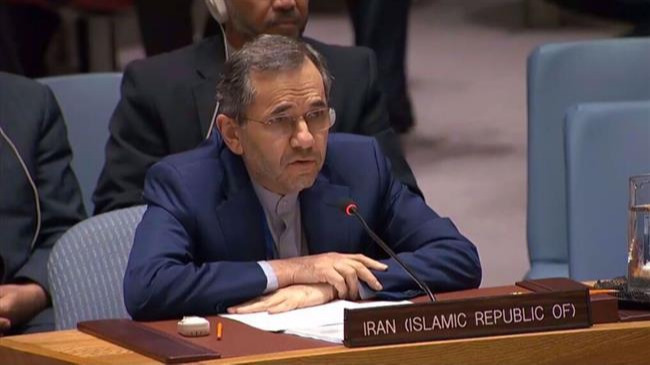
Iran's ambassador to the UN Majid Takht-Ravanchi
Tehran, February 24 (RHC)-- Iran’s ambassador to the United Nations says unilateral economic sanctions are one of the main obstacles to effectively counter the negative effects of climate change and must be lifted.
Majid Takht-Ravanchi made the remarks during a meeting of the UN Security Council on Tuesday that discussed the effects of climate change on global peace and security.
Takht-Ravanchi described dealing with the negative dimensions of climate change as a “collective” responsibility and said all governments must fully implement their obligations under the UN Framework Convention on Climate Change (UNFCCC) and the Paris climate accord.
“Sanctions severely undermine the ability of a number of developing countries, such as Iran, to meet the challenges of climate change,” the top Iranian diplomat said.
“Unilateral US sanctions against Iran have not only prevented the country’s access to the necessary financial resources and technologies, but have also adversely affected the effective use of national capabilities to meet its obligations, and therefore these illegal and inhumane sanctions should be lifted,” he added.
The Paris agreement seeks to avert climate change by limiting global warming to no more than 2 degrees Celsius above pre-industrial temperatures by 2050. It also sets out a goal of reaching a limit of 1.5 degrees Celsius, if possible.
Most scientists believe the world must cut emissions sharply and quickly in order to avoid the most catastrophic effects of global warming. China, Japan, South Korea, and the European Union (EU) have recently ramped up their carbon cutting targets.
In November 2019, the administration of former US President Donald Trump presented Washington's withdrawal letter to the UN, saying it would be officially out of the Paris accord on November 4, 2020, one day after the U.S. election.
During the UN Security Council meeting on Tuesday, Takht-Ravanchi stressed that developed countries have a greater responsibility to meet such challenges in view of their key role in climate change and their access to adequate technologies and financial resources.
“Developed countries should not only be at the forefront of reducing greenhouse gas emissions and provide adequate financial support to developing countries, but should also facilitate the transfer of climate-friendly technologies to these countries,” he told the meeting.
The Iranian envoy also said developing countries must live up to their commitments in accordance with their national capabilities and conditions, and reiterated that the international community must remove all obstacles to the effective implementation of their commitments, one of which is unilateral sanctions.
The Iran nuclear deal, formally called the Joint Comprehensive Plan of Action (JCPOA), was struck on July 14, 2015, between Tehran and six world powers – the U.S., Britain, France, Germany, Russia and China.
The JCPOA was unilaterally ditched by Trump in May 2018, in pursuit of what he called the “maximum pressure” policy against the Islamic Republic through unilateral sanctions. Iran has denounced the policy as an act of “economic terrorism”.
The U.S. withdrawal from the deal was met with worldwide criticism, and was followed, a year later, by Iran’s gradual reduction of its nuclear commitments. However, Tehran has repeatedly proclaimed that it will return to its nuclear obligations as soon as its interests under the JCPOA are met.

